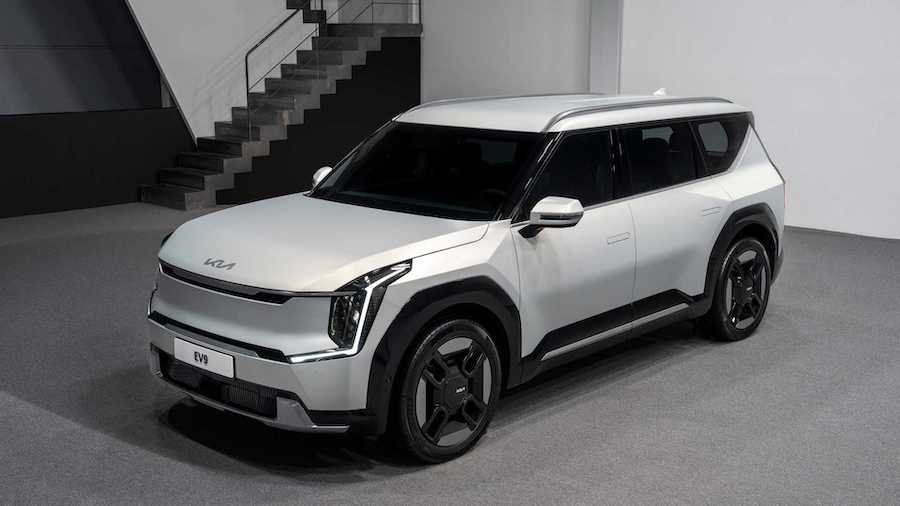2024 Kia EV9 Revealed As Electric Telluride In First Official Images

As automakers tip-toe into the world of electric vehicles, we’ve seen compact crossovers and luxury sedans and even a couple of pickup trucks. While there are still plenty of segments without all-electric offerings, the most surprising may be the lack of three-row crossovers from mainstream brands.
Enter the 2024 Kia EV9, which ditches the South Korean brand’s conservative last-in approach to new segments for an early adopter’s swan dive. While Kia isn’t sharing technical details on its first three-row EV just yet – look for all of that near the end of March, when Kia is planning a digital debut for the EV9 – the company did invite media to Seoul, South Korea to check out a full-size prototype wearing the finalized production design.
Get Outside
Park the 2024 EV9 next to the concept from the 2021 Los Angeles Auto Show and it’s hard to spot what’s changed in the march to production. The edges are softer, the wheel arches more substantial, and the headlights grow in place of the reflected pattern found on the concept – but the shape, the styling, the basic essence of the EV9 concept makes its way almost unfettered to the production car. There’s even an evolution of the traditional Kia Tiger Nose, called the “Digital Tiger Face.” Digital Tiger Face!
The design motif spans the width of the fascia, connecting the slim, vertical headlights that borrow heavily from both the concept and the production Telluride. There’s also an arrow-straight beltline that kicks up suddenly once past the rear door, triangular character lines that form the trailing and leading edges of the front and rear wheel arches, respectively, and intensely geometric wheel designs. In particular, the blocky wheels are a highlight – the car in the gallery features a square motif, but Kia also showed us an EV9 with a more triangular design like that found on the concept. The rear light design, meanwhile, is virtually identical to the concept, while the clamshell tailgate also mimics the show car.
Functionally, the biggest loss is the rear suicide doors – the production EV9 adopts a more conventional arrangement. Still, both the similarity to the concept and the inspiration from the gas-powered Telluride are surprising. The EV9 really gives up little while moving toward production.
In The House
The cabin takes a similarly evolved approach from the concept. The dash uses negative space to better integrate the floating slab-style display housing (which includes two 12.3-inch displays), itself a refinement of what Kia has been attaching to its production cars for a few years. The shelf-like dash also hides touch-capacitive buttons for navigating the infotainment screen. An open space in front of the center console emphasizes the space and flat floor afforded by the electric architecture.
The steering wheel is a conventional design versus the concept’s yoke, although some of that inspiration makes it to production with the twin horizontal spokes. The chairs, meanwhile, feature mesh headrests that are super comfortable – the shaped design is Volvo-like and quite attractive. Speaking of the back seats, they deserve their own paragraph.
The production prototype houses second-row captain’s chairs with a twist. They can rotate 180 degrees to face rearward, making it easier to socialize with third-row passengers. The seats also rotate 90 degrees outboard, making loading and unloading a bit easier. The third-row, meanwhile, is roomy enough for an adult on shorter journeys (not unlike the current Telluride).
Digital Debut Countdown
As we said, Kia isn’t sharing any technical detail on the EV9 short of acknowledging that the E-GMP platform underpins it. With that information, though, we can make a couple of safe assumptions. One, the EV9 will feature both a 400- and an 800-volt architecture, which will allow rapid DC charge speeds. Dual- and single-motor layouts should be available, while the increased size of the EV9 might allow a larger battery.
We’ll learn more about the EV9 in the coming weeks, as Kia is planning a digital debut before the end of March. The EV9’s in-person debut, meanwhile, should be at the New York Auto Show.



Nouvelles connexes


